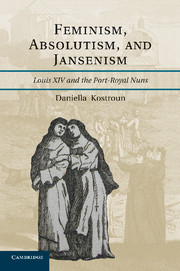Book contents
- Frontmatter
- Contents
- Acknowledgments
- Abbreviations
- Introduction
- 1 Jansenism as a “Woman Problem”
- 2 Controversy and Reform at Port-Royal
- 3 Jansenism's Political Turn, 1652–1661
- 4 The Limits to Obedience, 1661–1664
- 5 A Feminist Response to Absolutism, 1664–1669
- 6 The Unsettled Peace, 1669–1679
- 7 A Royal Victory, 1679–1709
- Conclusion
- Bibliography
- Index
- References
Introduction
Published online by Cambridge University Press: 05 August 2011
- Frontmatter
- Contents
- Acknowledgments
- Abbreviations
- Introduction
- 1 Jansenism as a “Woman Problem”
- 2 Controversy and Reform at Port-Royal
- 3 Jansenism's Political Turn, 1652–1661
- 4 The Limits to Obedience, 1661–1664
- 5 A Feminist Response to Absolutism, 1664–1669
- 6 The Unsettled Peace, 1669–1679
- 7 A Royal Victory, 1679–1709
- Conclusion
- Bibliography
- Index
- References
Summary
On October 29, 1709, King Louis XIV sent his royal lieutenant of police, along with 200 troops, into the valley of the Chevreuse, twelve miles west of Paris, to shut down the convent of Port-Royal-des-Champs. Sixty years earlier, Port-Royal had been a flourishing community containing more than 150 nuns. By 1709 there were only twenty-two left, all over the age of fifty and several of them infirm. On arrival, the lieutenant assembled the nuns in the convent's parlor and read them an order from the royal council stating that they were to be removed from the convent “for the good of the state.” He then presented them with lettres de cachet (special royal warrants signed by the king) sentencing each nun to exile in separate convents across France. They had only three hours to pack their belongings, eat a final meal, and say good-bye to one another. He then loaded them into carriages and drove them away. Shortly after that, Louis XIV's men exhumed Port-Royal's cemetery, dumped the remains in a mass grave, and razed the buildings to the ground.
How can we account for this episode in which Louis XIV personally ordered the destruction of a convent containing so few nuns? How could these women pose a threat to the state? Port-Royal's destruction becomes even more mysterious when we consider that it occurred at a time of political and domestic crisis for the French Crown.
- Type
- Chapter
- Information
- Feminism, Absolutism, and JansenismLouis XIV and the Port-Royal Nuns, pp. 1 - 17Publisher: Cambridge University PressPrint publication year: 2011



